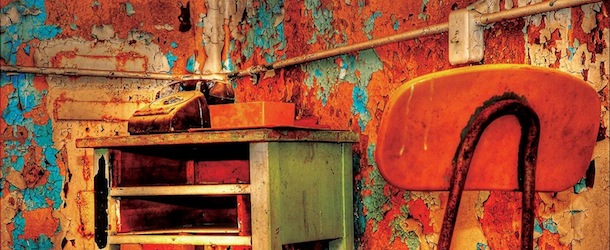There are two principal ingredients mingling at the fulcrum of Weldon Keys’ debut album: One country-inflected moan that betrays wistfulness and one insatiable electric guitar that fights it with joy.
On Dec. 19 at Vega, the Lincoln four-piece released its first offering, which exists only in a vivid vinyl packaging. Weldon Keys began about a year ago as a recording project. It was initially intended to provide a lifespan for some of the music written between Mark Bestul and J.D. Kuskie. And that factual detail is essential for understanding the breadth of the album. The songs feel distinctly like they’ve grown out of writing exercises between the guitarist Bestul and the singer Kuskie, rock guitar riffs with a significant degree of technical difficulty (given their speed and omnipresence), in a state of play with the singing.
Bestul (lead guitar), Kuskie (vocals, guitar) and David Merritt (bass, keys) all hail from a mid-2000s Lincoln band called Icarian Bird. In Weldon Keys, they’re joined by the storied Lincoln drumming hands of former Ideal Cleaners percussionist Ted Alesio (also of The Wondermonds).
The album opener “Prelude” is Exhibit A for the window dressing on which the album at first thrives. It presents musical flightiness and a hint of instrumental diversion before the guitar-speared delivery of the classic rock goods in “That Summer” take over. Even if the majority of the Weldon Keys meal is the equivalent of something hearty and American in the eight songs to follow, the transition from “Prelude” to “That Summer” is an appetite whetter.
Kuskie’s lyrics appear as a collection of ruminations over a formative but damaging relationship — a love lost that maybe should have been lost sooner for the sake of the narrator’s peace of mind. Past-obsessed songs like “That Summer” and “Revisionist” relate to each other as something insular, with the hindsight of a passion project devoted to love letters with crinkled corners and ambiguous dates, such as December 1991. The tracks are guided by a first-person, hammer-headed nostalgia from the lyrical school of John Mellencamp with the ultimate conclusion being that either Kuskie or the voice he speaks through has a lot to say about bygone relationships but openly acknowledges that confusion still reigns when he rehashes and rebrands the glory days.
The ethos of Weldon Keys’ music is innocent and appealing by virtue of how established it is within the lexicon of 20th century pop music. It’s stably working class — down to the metal-smelting band name, tweaked from the Beatrice-born poet Weldon Kees. In this right, there’s ample room in Nebraska music for a heartfelt version of this rock ‘n’ roll written by faithful fans of the genre wanting to lend their voices to it, even if the results are more personally than publicly ambitious.
Mark Bestul’s lead guitar is the star of these songs, almost entirely riff-oriented — the livelier half of the guitar-voice partnership. Reminiscent of See Through Dresses’ debut LP (but in a much more traditional rock aesthetic) the electric guitar with its two and three different riffs per song actually might have more to say about where verses and choruses stop and start than the lyrics.
And occasional divergences from that steadiness are notable. In “Bare Branches,” Kuskie’s voice slides in and out of notes as the choruses repeat and age and Bestul’s guitar stretches into one of the album’s rare uses of reverb. On “Another State,” Bestul’s mid-song solo (and his main repeated riff during verses) hinges on a blue note that scrapes against the song’s central chord.
In a Hear Nebraska song premiere of “Sofia (Part Two)” and “Old Letters,” Bestul spoke with affirmation of the band’s no-frills approach to the songs, to their playability. In the tradition of the ‘70s rock ‘n’ roll quartet, there’s no smoke and mirrors here, nothing the band couldn’t replicate on a live stage. Kuskie’s voice is affected with a country rock drawl that appears most at home on the song “Questions” where it matches traditional aesthetics with colorful pedal steel playing from Steve “Fuzzy” Blazek.
On this record, Weldon Keys compensates well for some its lost band-ness — for the days in which they considered themselves to be an “archival project.” They sprung for beautiful vinyl with burnt color covering and for the recording and mastering services of Mark Wolberg and Doug Van Sloun, respectively. The inclusion of Fuzzy Blazek’s pedal steel on “Questions” — a song they maintain will be less country onstage — demonstrates enough confidence in the live act and its straightforwardness that they might take an instrumental liberty or two on the album.
With all intention to perform in the future, it’s critical to consider that Weldon Keys has really only taken the one step so far — albeit a big one — toward realizing themselves as a creative force. This isn’t music that values pioneering genre or that stitches a new seam in the last fifty years of roots rock. It asks for the right to shred a little, to compose a few eye-catching parts and sing some hard memories off its chest. Of course.
Chance Solem-Pfeifer is Hear Nebraska’s staff writer. Seriously, if there were every a case for splurging on vinyl, it’s the visual packaging for this album. Seek it out. Reach Chance at chancesp@hearnebraska.org.




